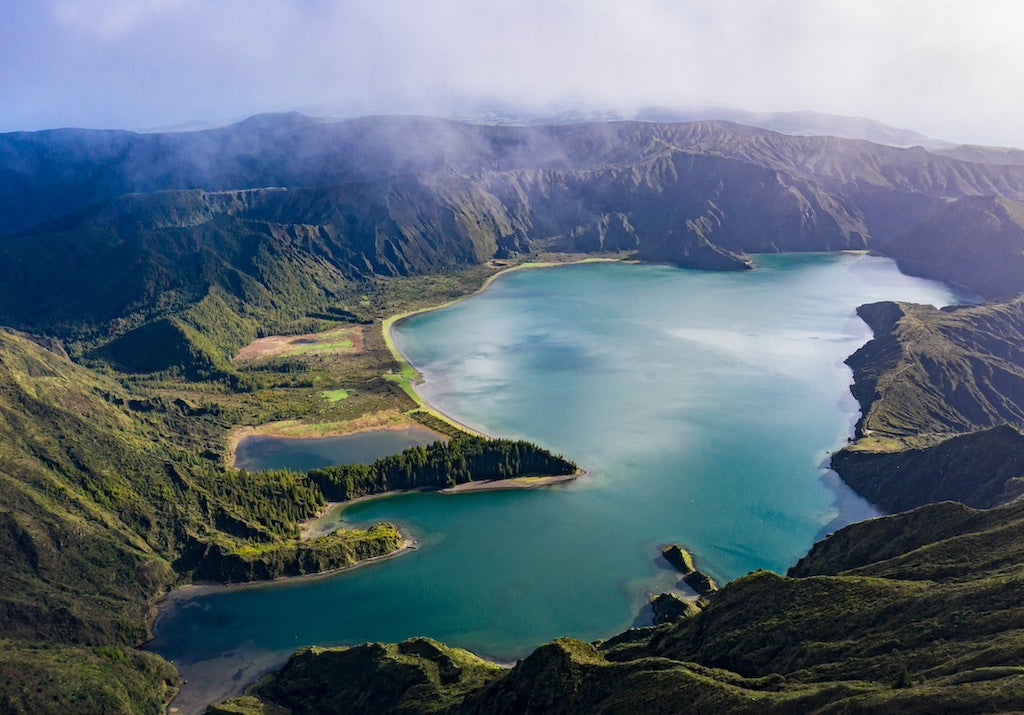The Azores, nine islands 870 miles west of Lisbon, is as far west as you can go in Europe. Most of it is a wild paradise with volcanoes to hike up, hydrangea-covered hills to wander through, and top-notch surfing – the ‘Hawaii of Europe,’ some say. And now you can add a growing number of boutique hotels, some of which are sporting top chefs building an exciting dining scene – one that is making the most of the archipelago’s particularly flavorful produce.
Stallholders in the Mercado do Graça in Ponta Delgada, the Azorean capital on the main island of São Miguel, are trying to outdo each other with their displays of homegrown pineapples. And they have something to shout about: They are the only pineapples grown in Europe, introduced in the 19th century after a pressing need for a cash crop and not exactly easy to cultivate. We discover all of this with our guide, Carina Ramos, the morning before eating a delicious lunch prepared by locals.
No, we aren’t piling into people’s homes – this is all part of a culinary event called Como em Casa (‘Like at Home’), which invites amateur cooks into a professional hotel kitchen. It’s an initiative dreamed up by forward-thinking Portuguese boutique hotel group Octant that places localism at the heart of operations and aims to highlight the knowledge and flavors of each region in its restaurants. Boasting impressive sustainability and eco-friendly credentials, the eight-strong, design-led group, with properties from the Douro to the Algarve, launched Como em Casa last October, taking the event – and the legacy it leaves – to each of its hotels. Now it’s Octant Ponta Delgada’s turn, with its smart new sea view suites and new food and wine shop.
[See also: Delve into the Mediterranean Diet at Caruso, A Belmond Hotel]
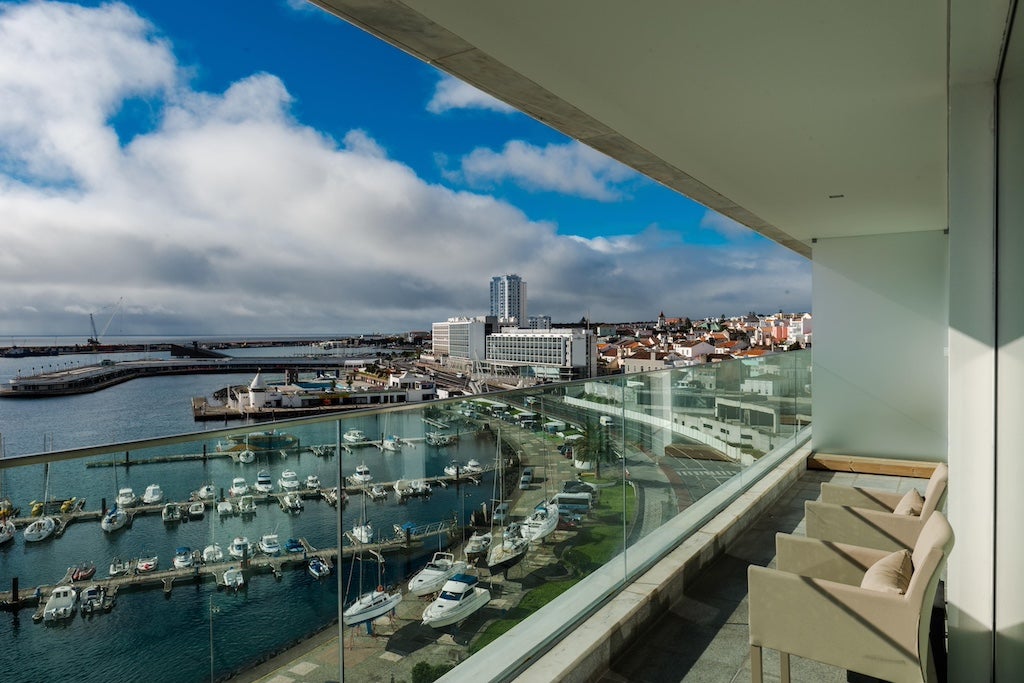
A goodie basket in our room greets us on arrival, and it’s laden with the best the island has to offer, from the sweet pastries queijadas de Vila Franca to addictive, salty pimenta da terra (red pepper paste), typically smothered over fresh cheese and served at the start of every meal here. But it’s Ramos, the hotel’s experience manager, who brings the stories to life as we move around the market, feeding us samples of local specialties and introducing us to the people who make it happen – from the hotel’s butcher to its fruit and vegetable supplier. And thanks should go to Octant Ponta Delgada’s Como em Casa coordinator, Teresa Vivas, who, with a bit of clever sleuthing, discovered the amateur village cooks who wanted to share their recipes and stories.
We meet IT worker Paulo, who shares his grandmother’s deeply flavored chorizo, black pudding and cabbage broth, and his mother’s heady octopus stew, made piquant with local pepper pimenta da terra; and we meet home cook Vânia and try her bread-stuffed mackerel laced with sweet paprika and her light, airy margaridas pastries. Last out is Marilia and her melting beef stew from her home on Terceira Island, made aromatic with cinnamon and bay, and finishing with Faial Island speciality fofas, fennel-flecked buns filled with a lemony cream. Eyes sparkle as they each run through their recipes in the hotel’s À Terra restaurant, encouraged by head chef Paulo Leite, who is clearly getting as much out of it as the amateur cooks.
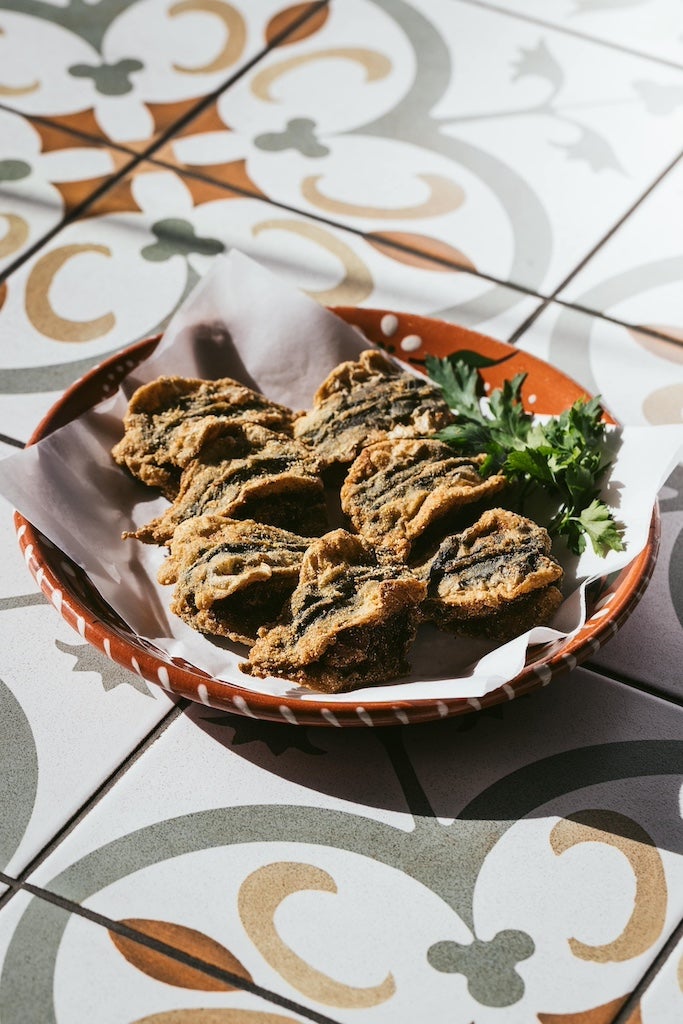
Azores’ cuisine is Europe’s best-kept secret. The nutrient-rich volcanic soil gives a distinct terroir to the food produced here, from the highly prized beef (there are said to be more cattle than people in the Azores), to the dialed-up flavors of the fruit and vegetables, but the terroir is most notable in the abundance of cow’s milk cheeses, which range from soft and creamy to hard and salty. One cheese, in particular, grabs our attention – São Jorge, named after the island where it is made; it’s a tangy, semi-hard raw cow’s milk cheese that silences the group as we nibble on it at the market’s best cheese shop, O Rei dos Queijos. We tried it again for lunch with an ambrosial Azorean fortified wine plucked from the hotel’s list packed with local wines. Yes, the Azores produces wine, too – thrilling and age-worthy, and in need of further exploration.
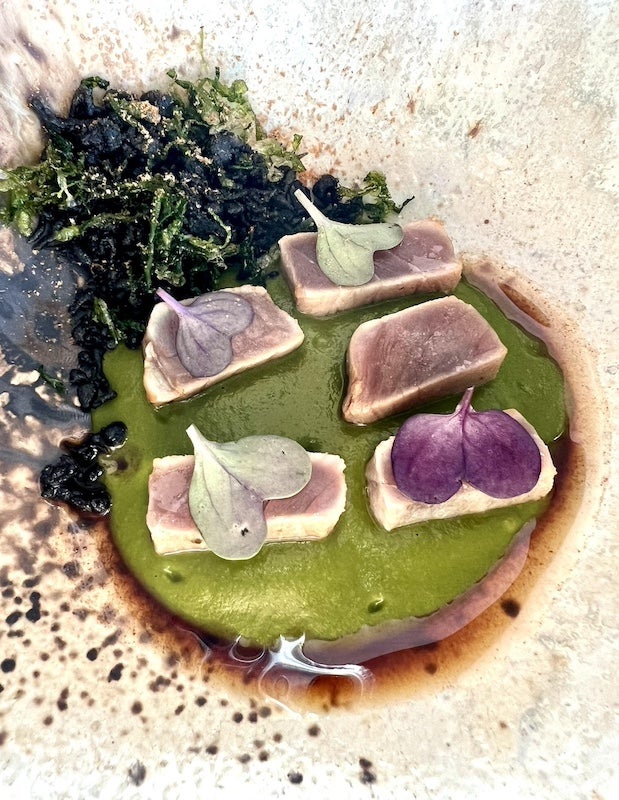
It’s a 55-minute flight to Pico Island, some 210 miles further west, where much of the Azores’ wines are made. Wine has been produced here since the 15th century – but like with the pineapples, it’s no easy ride. Yields are low and obstacles are many, from the strong Atlantic winds to birds scoffing the grapes, but producers stick with it because the potential is huge.
The revival began here more than a decade ago, thanks largely to the Azores Wine Company (AWC) and its star Portuguese winemaker António Maçanita, who made it his mission to revive forgotten grape varieties, such as Terrantez do Pico. Add to that a curious training system where vines grow through cracks in the volcanic rocks enclosed in centuries-old stone currais that protect against the Atlantic winds and you have a unique terroir, one listed as a Unesco World Heritage Site since 2004. And there’s a smart winery accommodation on-site and chef-to-watch Rui Batista in the kitchen, who serves up a stunning tasting menu to match AWC’s equally exciting wines, coveted by sommeliers the world over.
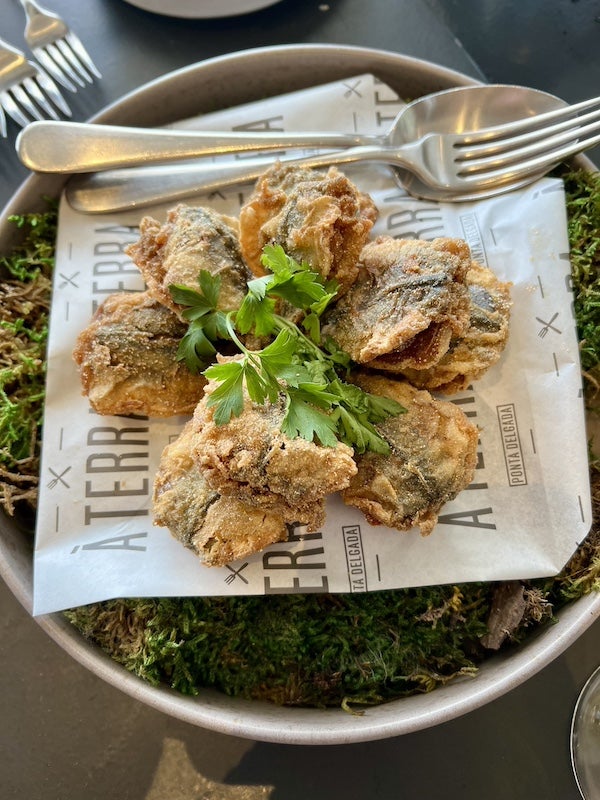
At the other end of the presentation scale, but no less delicious, is cozido, a traditional hearty stew of meats and vegetables slow-cooked in a hot spring. We’re back on São Miguel to try this Furnas speciality, the town famous for its rejuvenating hot springs just a 45-minute drive east of Octant Ponta Delgada. With more than a whiff of Jurassic Park about it (it smells faintly of sulfur), Furnas lies in a dormant volcanic crater, the old geothermal power station is now a swanky, 55-bedroom boutique hotel – Octant Furnas boasts its own hot springs, employing a sustainability manager to keep things on track.
Part of the Octant mission is to keep local traditions alive – and what better way to do that than by getting the guests involved in making cozido. We report to the kitchen at 11am, and under chef Delia’s instructions, we start peeling and chopping, helping her to layer up the pot, salting as we go, before topping with cabbage to keep things moist. The pot is then wrapped tightly in cloth before being transported by car to the hot springs and lowered into the ground, where it will remain for the next six hours. We use that time for an appetite-building walk around Furnas Lake, trying to spot a priolo (an Azores bullfinch) found only on São Miguel, and to plot a return visit to this remarkable, otherworldly, flavor-rich archipelago.
[See also: Experience the Authentic Food of Nevis on this Culinary Tour]





